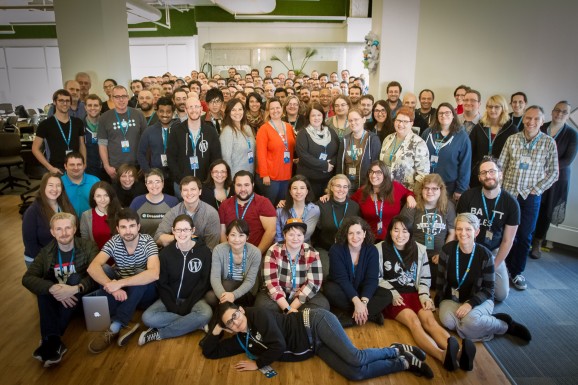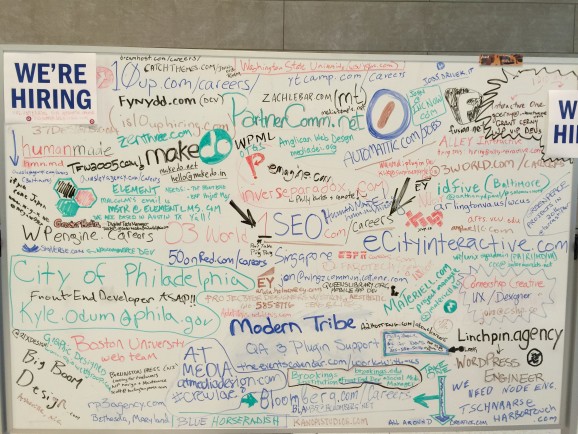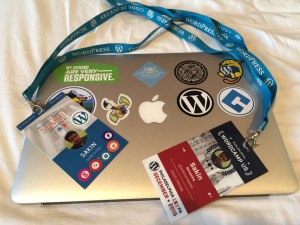
Just got back to Kathmandu after an amazing trip to the US, where I attended WordCamp US 2015 in Philadelphia. It was an exciting few days, with me running around making sure I soaked in everything I could. Time just flew by.
When I left Nepal for WordCamp US, the very slow pace of the theme review process (You can read here) was at the forefront of my mind. I was looking forward to raising this issue with colleagues in Philly, and hopefully come up with some kind of a solution.
I am happy to report that we had a meaningful discussion on the problem, which was a concern for many. The discussion ended positively, with a decision to take an important step in tackling this problem. Previously, only Admins and Key Reviewers were able to make themes live after review. This had resulted in double queues for themes; one to get reviewed, and one to become live after review. I am happy to report that now, we will have new trusted reviewers: theme reviewers who have been doing good work on reviews for a long time; who will also have permissions to make themes they reviewed directly live. This will result in significant improvements in getting themes live.
Of course, Matt Mullenweg’s State of the Word was highly anticipated. I noted one statistic, that there have been 89 WordCamps in the world this year, with over 21,000 attendees. It is an honor for all of us who worked hard to organize WordCamp Nepal (link), despite problems, to become a small part of that statistic.
Of course WordCamp US is THE flagship WordCamp, and this year’s was the biggest WordCamp ever, with over 1,800 signups. With so many core WordPressers, it was a great place to peer into the future of our favorite platform.
There seems to be a high level of agreement on the three major trends we can expect to see in WordPress. These trends will be central to WordPress development, and will dictate the kind of know-how that WordPress developers need to cultivate very very soon.
The first is Javascript. WordPress will be moving towards more Javascript-centric development, and doing so rapidly. In his speech, Matt also put a lot of emphasis on Javascript, saying he would be learning it himself.
A second trend is a move towards API driven development, which is increasingly going to become a core part of the open web. So expect to hone your skills in this area if you want to be a WordPress developer that is relevant to the platform’s future.
The third major trend you need to get on board with is accessibility. A lot of the sessions in WordCamp US addressed accessibility in a small or big way. Many corporations are making it compulsory for their pages to be accessible, and legal mandates for accessible websites are expected to start. According to a statistic that was making the rounds, 1 in 5 people in the US have some sort of disability. So making your sites accessible is not just the right thing to do for many businesses, it is the savvy thing to do.
WordPress core is not just supporting, but actively incorporating accessibility readiness, and pretty soon, accessibility-readiness looks set to become not just a bonus feature on a theme, but a core requirement of any theme. At Catch Themes, we are now planning to update all our themes and make them accessibility ready. This will be our major focus in the coming days.
Talking about our focus areas, we had been thinking about developing highly focused themes for various customer segments for some time. My time at WordCamp US also made me more determined to go down this road. So far, Catch Themes has been developing a lot of multipurpose themes, with a lot of functionality, and the ability to turn features on or off. However, we will soon start releasing themes with tailored features that are relevant for niche markets. Our customers can look forward to a wider range of offerings, easy-breezy setup, and have a product that is exactly what they want out of the box.
Lots of things learned. I also came away with a few things I learnt that will make my own life and work easier. I have been sold on the Vagrant server, and am planning to move from xamp and wamp to Vagrant. Vagrant is a clone server, making the process from offline coding to going live easier, and I am really looking forward to using all the collaboration features.
All in all, WordCamp US was a grand success with huge turnout, and a very happening after-party. There was so much learning and working to do that I really did not have time to see much of the great city of Philadelphia. Although it was amazing that the Philadelphia City Council officially declared December 5 as WordPress day.

With a whole day to our name, and big picture priorities such as accessibility, Javascript, and API based development squarely in our sights, WordPressers look set to make even bigger waves in 2016. It was cool to be there in Philly, step back, and appreciate being part of the amazing community that is responsible for powering 25% of the whole world wide web.

